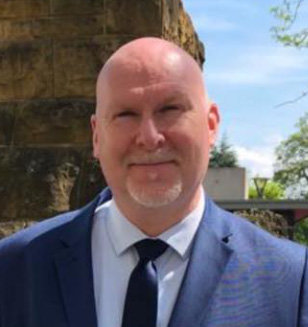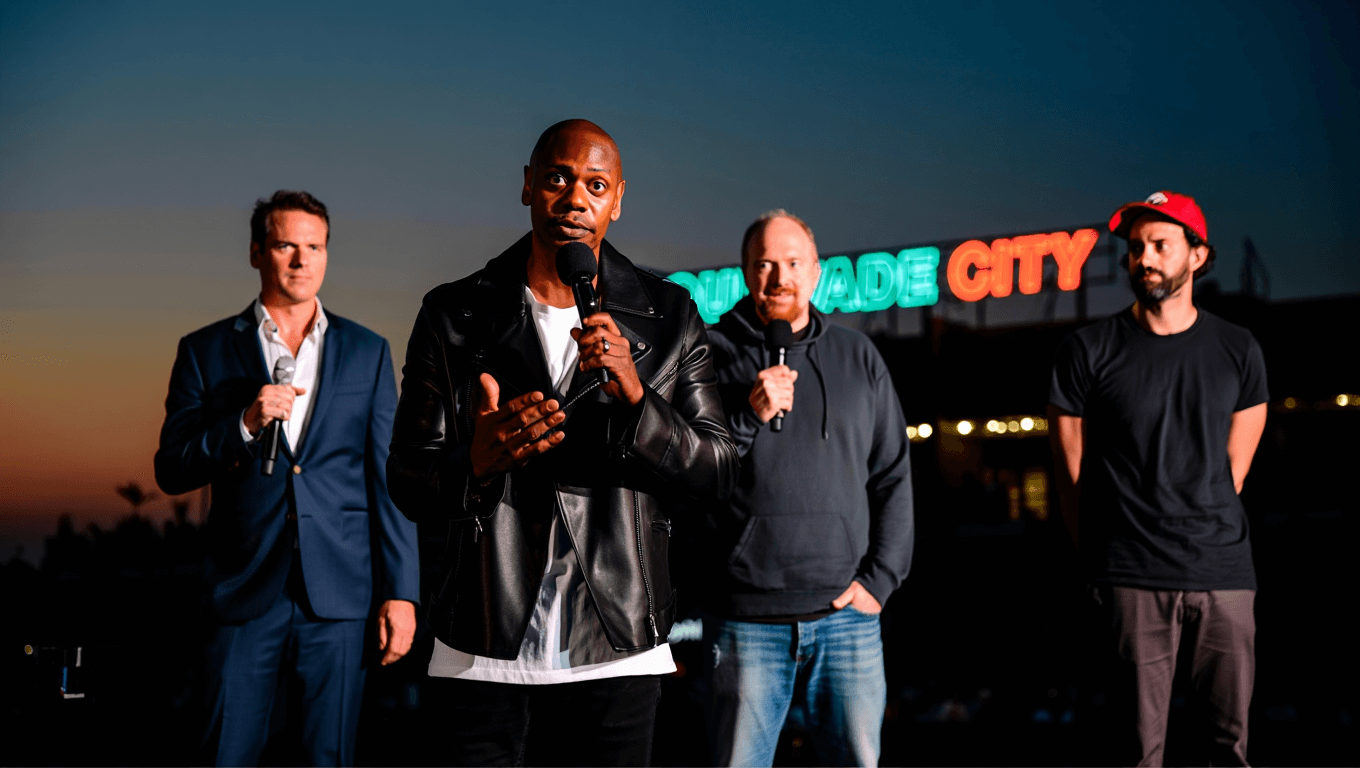Over 50 comedians performed at the inaugural Riyadh Comedy Festival, held from September 26 to October 9, 2025. The event brought together A-list performers including Dave Chappelle, Bill Burr, Louis C.K., Kevin Hart, Pete Davidson, Jimmy Carr, and Jack Whitehall. Saudi Arabia’s government-backed festival sparked massive backlash for showcasing performers in a nation with severe human rights concerns.
Taylor Swift Blake Lively friendship officially ends after 10 years, no contact since Dec
Super bowl halftime show 2026 sparks outrage as NFL stands firm on Bad Bunny
🔥 Quick Facts:
- 50+ global comedians performed at the inaugural festival in Boulevard City.
- Festival ran from Sept. 26 to Oct. 9, 2025, coinciding with the 7th anniversary of Jamal Khashoggi’s murder.
- Performers earned up to $1.6 million per set according to reports.
- Human Rights Watch called the event an attempt to “whitewash” Saudi abuses.
- Several comedians turned down offers, citing ethical concerns and censorship restrictions.
What Happened at the Festival
The Saudi General Entertainment Authority organized the inaugural Riyadh Comedy Festival as part of Vision 2030. The event welcomed international performers to Boulevard City, a sprawling entertainment hub. Attendees reported seeing explicit jokes about sex, marriage, and even transgender topics in a country known for ultra-conservative values.
Wednesday season 3 renewed: Netflix confirms Jenna Ortega returns in 2027
Taylor Swift and Blake Lively’s friendship permanently ends after 10 years, no contact since Dec 2024
Comedians like Omid Djalili performed sets about Saudi culture and women drivers. Dave Chappelle made multiple jokes about transgender people and American politics. Bill Burr stuck to safer material about his wife and family during his set.
“Everybody’s phony about this stuff. You go to China, Dubai, Saudi Arabia — it’s all complicated. But meeting audiences who just want to laugh? That’s real.”
However, comedy wasn’t entirely unrestricted. Comedian Tim Dillon was reportedly fired after making jokes about slavery among migrant workers. Jim Jefferies and others had invitations rescinded after controversial comments about Saudi human rights violations.
Why This Sparked Major Outrage
The backlash centered on one troubling fact: some of the world’s most vocal free-speech advocates performed in a country that violently silences dissent. Critics noted the festival’s timing coincided with the seventh anniversary of journalist Jamal Khashoggi’s murder in Istanbul.
A leaked contract from comedian Atsuko Okatsuka revealed apparent censorship clauses. Performers couldn’t create material that “degrades” the Saudi royal family or its legal system. Yet comedians who performed claimed they faced no such restrictions. This contradiction fueled accusations of hypocrisy and “selling out.”
Activist performers condemned their peers. David Cross wrote a scathing open letter calling attendees “evil, amoral, grifting bastards.” Comedian Marc Maron joked darkly: “From the folks that brought you 9/11.” Zach Woods posted viral TikToks criticizing the appearance of moral compromise.
The Money Behind the Controversy
Let’s be clear: money drove these decisions. Reports indicated Tim Dillon was offered $375,000 for a single set. Some performers allegedly received offers exceeding $1.6 million. This financial incentive dominated discussions among comedians evaluating whether to attend.
| Comedian | Status | Position |
|---|---|---|
| Dave Chappelle | Performed | Made multiple sets, defended participation |
| Bill Burr | Performed | Called it “one of the top 3 experiences” |
| Louis C.K. | Performed | Said “only 2 restrictions” in contract |
| Shane Gillis | Declined | Turned down “significant” offer on principle |
| Atsuko Okatsuka | Declined | Leaked censorship contract details publicly |
Jessica Kirson, a lesbian Jewish comedian, made waves by issuing a public apology after performing. She pledged to donate her entire fee to Human Rights Campaign. Pete Davidson was more blunt: “I see the number and go: ‘I’ll go’.” Chris Distefano revealed his fiancée instructed him to “take that fucking money.”
What Critics Are Demanding
Human Rights Watch called the festival government-sponsored whitewashing. The organization urged all performers to raise issues about detained dissidents and political prisoners. None did. Saudi Arabia has imprisoned cartoonist Al Hazzaa for 23 years for satirical drawings.
Alternatively, Saudi Arabia has jailed artists for social media content. Abdulaziz Almuzaini, creator of Netflix’s satirical show Masameer County, was sentenced to 13 years in prison. The government claimed his work “promoted homosexuality” and constituted “terrorism.”
Critics want performers to acknowledge this hypocrisy openly. Many have refused, citing professional obligations to their comedy careers instead.
Will There Be Real Consequences?
Industry insiders offer contrasting assessments. Some believe reputational damage will prove minimal and temporary. Eric Schiffer, a reputation management expert, predicted most Americans will forget the controversy within months. New projects will overshadow this moment by next year’s entertainment cycles.
Others believe principles matter and memory is permanent. Stewart Lee described participants as “evil” performers. Multiple organizations have pledged to monitor which comedians performed and make that information publicly available for audiences considering ticket purchases.
The Saudi government views the festival as a resounding success regardless. Vision 2030’s strategy involves normalizing such international events. They’ve invested in LIV Golf, gaming companies, and major sports franchises using similar approaches. Entertainment “sportswashing” and “culturewashing” are becoming their playbook.
Watch analysis of the festival and backlash here: https://www.youtube.com/watch?v=griaVvUuBK4
Can Comedy and Conscience Coexist in Saudi Arabia?
The festival crystallizes a fundamental tension facing performers globally. Does performing in difficult places create change? Or does it simply provide cover for oppressive regimes? Comedian Nimesh Patel initially accepted then declined, saying the money “wasn’t life-changing enough” morally to justify the appearance with such circumstances attached.
Saudi Arabia insists it’s opening up. Entertainment and tourism are now central to economic diversification. Yet the contradiction remains stark: the same government that imprisoned satirists and monitors dissent now hosts a comedy festival celebrating free expression. The question isn’t why comedians went—the answer is obvious. The question is whether laughs purchased by human suffering represent comedy’s future.
Sources
- The Guardian – Detailed reporting on human rights concerns and comedian responses.
- BBC News – First-hand accounts from attendees and analysis of content restrictions.
- The Hollywood Reporter – Financial details and industry perspective on lasting reputational impact.
Similar posts:
- Over 50 A-list comedians spark backlash at Riyadh Comedy Festival
- Riyadh Comedy Festival wraps record inaugural event with 50+ global comedy icons
- Riyadh Comedy Festival sparks major backlash as 50+ comedians face criticism for Saudi performances
- “They just wanted to laugh” Sparks Outrage In 2025 – Here’s Why It Matters
- “It’s Easier To Talk Here” Sparks Debate Over Comedians’ Saudi Sets In 2025

Daniel Harris is a specialist journalist focused on the crossroads of breaking news, extraordinary history, and enduring legends. With a background in historical research and storytelling, he blends timely reporting with timeless narratives, making complex events and ancient myths resonate with today’s readers. Daniel’s work often uncovers surprising links between present-day headlines and legendary tales, offering unique perspectives that captivate diverse audiences. Beyond reporting, he is passionate about preserving oral traditions and exploring how extraordinary stories continue to shape culture and identity.

